Kelsey Grammer: ‘We take ourselves so seriously that almost everything can offend someone. We need to calm down a little’
The actor first played Frasier Crane, his most iconic role in 1984; now, 19 years after the end of the classic show, the doctor is back
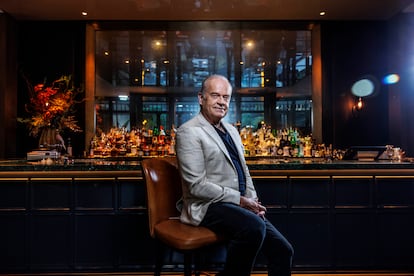
The first time he played Frasier Crane, Kelsey Grammer was 29 years old, and he was one of the supporting actors of the comedy Cheers. Later he became the star of another series that would end up being even more popular and awarded than its predecessor — in fact, to this day it is still the comedy with the most Emmy awards in history. A few days ago, Grammer, a confessed Republican, steadfast defender of Donald Trump and devout Christian, visited Spain to talk about the return of the series, available on Paramount+. With his deep voice, he answers every question in a concise, unhurried and friendly manner.
Question. How is the Frasier of today different from that of 20, 30, 40 years ago?
Answer. Well, he’s obviously older, but he’s more comfortable in his own skin. He’s less in a panic about what his life means. He has a bit more of a sense of humor about himself. So he’s matured. He’s not quite all the way there, but he’s just a kinder, gentler Frasier.
Q. You have been playing this role since 1984, on Cheers. What is it like to be with a character for so long?
A. Playing this character is sort of like living life: it’s up to you how you do it. Life is consistently surprising to me, and interesting. People have asked me before: “Wouldn’t you get tired of playing the same character?” Only if you get tired of life.
Q. After 19 years, how was your reunion with the character?
A. It was interesting to put him back on. It was like an old set of clothes I’d forgotten I had, that have been tailored a little bit differently now. I mean, he looks a little different. But he’s still enthusiastic about every day he wakes up, and that’s one thing I’ve always found remarkable about him as a character: he suffers so many things, gets through so many hardships, but he gets up the next morning and he’s ready to fight again.
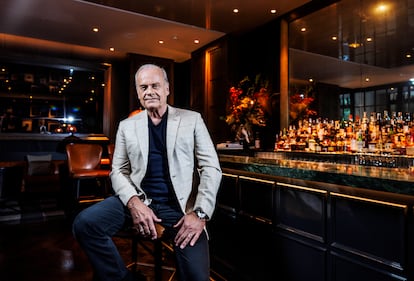
Q. When an actor is so attached to a character, the audience may think that they’re both one and the same. How are you and Frasier different?
A. Fraser is part of my imagination. I kind of created him. So there’s that. But he’s not really who I am. I don’t live the same way. I’m much less fastidious; I’m a little more casual. I spend less time worried about myself. Frasier’s a bit self-obsessed, but he still wants to do the world some good, and I still want to do the world some good, so we’re similar in that way.
Q. The new Frasier follows the format of the traditional sitcom, with a live audience, laughter... Is this a type of show that resonates with today’s audience?
A. I think it does, actually. Is it familiar to this culture? Not anymore. But the greatest shows that we’ve all watched for decades are multi-camera sitcoms. From Cheers to Cosby to Roseanne, there were dozens of shows. Friends is still that kind of show. Will & Grace was that kind of show. They’re the ones that stick. Even back to Dick Van Dyke, which was actually shot single camera, but was presented in the same way. Like a situation comedy. And they are the shows we carry, we hold on to throughout time.
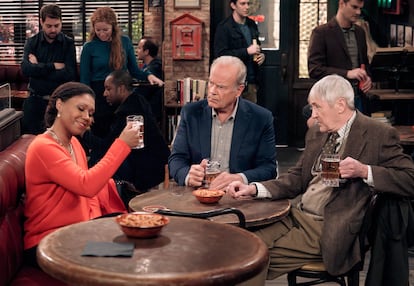
Q. Earlier I asked you about Frasier Crane’s changes over the years; but how have you changed as an actor over the years?
A. Well, it’s interesting. [Legendary British actor and theater director] John Gielgud said it takes 17 years to become an actor. I was about five or six years into it when I first started playing Fraser on Cheers, and I think he was on to something. There’s a kind of life experience that will fill in the stature of a character. If you don’t have it in your own life, your character won’t have it. So a young character is a little bit less interesting, honestly. That’s because life is like that. I just have more life experience, and that probably filters in a little bit. I have a wry sense of humor, so I’ve loaned that to Fraser, I suppose.
Q. Is it harder to do comedy and humor today than it was 20 or 30 years ago?
A. I think it’s more difficult to stop people from being victims. Victimhood is a very popular thing right now. Everybody’s got a reason to be, “Oh, I’ve suffered this,” or “I’ve suffered that,” or “Oh, look at me, look at me as I am.” You know, okay, look, we’re all people. We all suffer. We’ve all been victims. Everybody’s had a situation where they didn’t do so well or they weren’t treated so well. What is different now compared to maybe 30 years ago? People had a better sense of humor about themselves. Today we take ourselves so seriously that almost everything that comes out of somebody else’s mouth can cause someone else to be offended. I think we need to calm down a little.
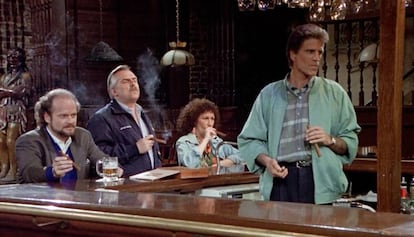
Q. You have always been very clear about your political opinions. Have you had any problems in Hollywood because of that?
A. Oh, no. I haven’t really sensed that, but I don’t worry about it too much. I mean, I’m a conservative. To my understanding, what “conservative” means is that the individual is the greatest national treasure. And that’s what I strive toward. To make sure that every person in the world is as important as another.
Q. In today’s world, with so many wars, so many problems, what is the role of comedy?
A. Well, I think as the world gets crazier, humor becomes more important. I mean... if you can’t laugh, you’re so screwed.
Q. And what role does an actor have in today’s world?
A. It’s always about changing the world, isn’t it? I mean, once we find our purpose, what we believe we can do better than anything else, we want to save the world, at least our portion of it, to do our best to make it a better place. Whether you’re a warrior or a poet or an actor or a writer, we’re doing our best to make our corner of the world a better place to be.
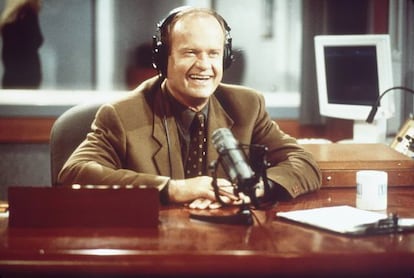
Q. And how does an actor achieve that?
A. An actor, as Shakespeare said, holds a mirror up to life, and helps people get through it, to navigate life, to look at it, to give them a perspective that maybe they didn’t have, to realize that we are one, that we’re connected and that our human experience is actually universal.
Q. We have also seen you do drama. I remember Boss, a completely different character. Where are you most comfortable, on comedy or drama?
A. That was my favorite role, Tom Kane [in Boss]. He was just wonderful. He was wonderful to play because he was so mean, and sort of tough, and comical sometimes, because he had no boundaries. Tom Kane would do anything. He would kill anybody.
Q. It’s more fun to play a villain, an antihero.
A. Yeah, actors really like to play bad guys. They have no moral compass. There are no holds on your imagination when you’re playing a bad guy.
Sign up for our weekly newsletter to get more English-language news coverage from EL PAÍS USA Edition
Tu suscripción se está usando en otro dispositivo
¿Quieres añadir otro usuario a tu suscripción?
Si continúas leyendo en este dispositivo, no se podrá leer en el otro.
FlechaTu suscripción se está usando en otro dispositivo y solo puedes acceder a EL PAÍS desde un dispositivo a la vez.
Si quieres compartir tu cuenta, cambia tu suscripción a la modalidad Premium, así podrás añadir otro usuario. Cada uno accederá con su propia cuenta de email, lo que os permitirá personalizar vuestra experiencia en EL PAÍS.
¿Tienes una suscripción de empresa? Accede aquí para contratar más cuentas.
En el caso de no saber quién está usando tu cuenta, te recomendamos cambiar tu contraseña aquí.
Si decides continuar compartiendo tu cuenta, este mensaje se mostrará en tu dispositivo y en el de la otra persona que está usando tu cuenta de forma indefinida, afectando a tu experiencia de lectura. Puedes consultar aquí los términos y condiciones de la suscripción digital.









































